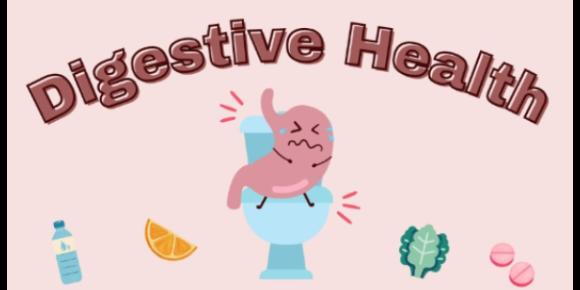Digestive Health

- posted: Oct. 18, 2023
The health of our gastrointestinal system is very important but not always properly cared for. Our gastrointestinal system, or GI system, is made up of the stomach, intestines, and colon. Each of these organs absorb nutrients from the foods we consume to keep us healthy and help us to grow strong. The gut microbiome, or gut bacteria, keep our GI system strengthened and protected so that it can process our nutrients effectively. There are trillions of bacteria, both good and bad, living in our gut in a perfect balance. The good bacteria keep the bad bacteria from over-growing and help to reduce illness, stomach pain, and boost our overall immunity. Therefore it is important to keep our good gut bacteria healthy.
Our diet is one of the principal components to maintaining a healthy gut microbiome. Processed foods such as fast food, chips, cookies, and candy are difficult to digest and can increase gut inflammation. This can cause stomach discomfort and irregular bowel movements. Sugary foods can also upset the stomach. Sugar feeds the bad bacteria which can cause an imbalance in the overall gut microbiome. These foods should be limited in our diet which is important to remember as we near Halloween when consumption of processed and sugar-rich foods are heightened.
Foods that promote a healthy gut microbiome are ones that contain good bacteria themselves. Plain yogurt and other fermented foods like kimchi, natto, and sauerkraut can add more good bacteria to the digestive tract. These are good to consume during or after taking antibiotics or having a gastrointestinal illness consisting of vomiting and/or diarrhea. These scenarios can deplete the good bacteria from the gut so it is beneficial to replace them with foods containing live bacterial cultures or a probiotic supplement.
Fiber-rich foods nourish the good bacteria within the digestive system which help keep the gut microbiome healthy and strong. Foods such as fruits, vegetables, legumes (edamame, lentils, nuts), and whole grains provide the body with fiber and are important to include with every meal. Fiber also prevents and treats constipation, another common pediatric GI complaint, by drawing more water into the stool to keep it soft. Foods that contribute to constipation include bread, rice, noodles, and bananas which should be limited. The goal is to have a wide variety of foods on the plate with every meal and to drink lots of water throughout the day.
Creating healthy habits at a young age can make it easier and more likely to perpetuate throughout adulthood. So remember to increase fiber and fermented foods to bolster digestive health and limit consumption of processed and sugary foods, especially with the upcoming holidays.

- posted: Oct. 18, 2023
The health of our gastrointestinal system is very important but not always properly cared for. Our gastrointestinal system, or GI system, is made up of the stomach, intestines, and colon. Each of these organs absorb nutrients from the foods we consume to keep us healthy and help us to grow strong. The gut microbiome, or gut bacteria, keep our GI system strengthened and protected so that it can process our nutrients effectively. There are trillions of bacteria, both good and bad, living in our gut in a perfect balance. The good bacteria keep the bad bacteria from over-growing and help to reduce illness, stomach pain, and boost our overall immunity. Therefore it is important to keep our good gut bacteria healthy.
Our diet is one of the principal components to maintaining a healthy gut microbiome. Processed foods such as fast food, chips, cookies, and candy are difficult to digest and can increase gut inflammation. This can cause stomach discomfort and irregular bowel movements. Sugary foods can also upset the stomach. Sugar feeds the bad bacteria which can cause an imbalance in the overall gut microbiome. These foods should be limited in our diet which is important to remember as we near Halloween when consumption of processed and sugar-rich foods are heightened.
Foods that promote a healthy gut microbiome are ones that contain good bacteria themselves. Plain yogurt and other fermented foods like kimchi, natto, and sauerkraut can add more good bacteria to the digestive tract. These are good to consume during or after taking antibiotics or having a gastrointestinal illness consisting of vomiting and/or diarrhea. These scenarios can deplete the good bacteria from the gut so it is beneficial to replace them with foods containing live bacterial cultures or a probiotic supplement.
Fiber-rich foods nourish the good bacteria within the digestive system which help keep the gut microbiome healthy and strong. Foods such as fruits, vegetables, legumes (edamame, lentils, nuts), and whole grains provide the body with fiber and are important to include with every meal. Fiber also prevents and treats constipation, another common pediatric GI complaint, by drawing more water into the stool to keep it soft. Foods that contribute to constipation include bread, rice, noodles, and bananas which should be limited. The goal is to have a wide variety of foods on the plate with every meal and to drink lots of water throughout the day.
Creating healthy habits at a young age can make it easier and more likely to perpetuate throughout adulthood. So remember to increase fiber and fermented foods to bolster digestive health and limit consumption of processed and sugary foods, especially with the upcoming holidays.
Monday
8:00 am - 12:00 pm
1:15 pm - 5:00 pm
Tuesday
8:00 am - 12:00 pm
1:15 pm - 5:00 pm
Wednesday
8:00 am - 12:00 pm
Thursday
8:00 am - 12:00 pm
1:15 pm - 5:00 pm
Friday
8:00 am - 12:00 pm
1:15 pm - 5:00 pm
Saturday
Closed
Sunday
Closed